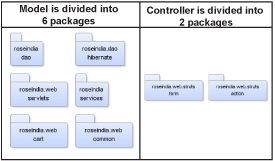|
|
|
|
• Product catalog: Product catalog displays the list of
items. It helps the customers to quickly browse the
details of the products available to buy.
• Adding items to the cart: This feature provides a
mechanism to add multiple products to a cart. Moreover
options are provided to choose quantity of a
particular item.
• Updating Quantity: This feature enables to update the
quantity of a product..
• Remove Items/Product: Remove feature enables to
remove a selected item from the shopping cart.
• Checkout /Place order Form: After selecting the
multiple items, customers can place an order by filling
the Proceed to Checkout form. In this form customer
has to fill personal as well as his credit card information.
Administrative Features
• Catalog management: This feature enables to add
and edit categories and subcategories. Here, the
administrator can add the number of products to the
Catalog Listing by providing the product details like
Category ID, Category Name and Parent ID etc.
Following options can be opted.
• Add/Edit Categories or Subcategories
• Add/Edit Product
• Check orders: Here, the administrator check the
orders placed by the customers with the details such
as Order Id, Customer, Email, Address, Phone number,
Ordered products, Order total, Order time and Quantity.
• Configuration: Here, the administrator can update the
following relevant information.
i Store Name
ii Store URL
iii Notification mail-id
iv Currency Symbol & Code
v About Us content
vi Shipping and Delivery content
vii Changing password
Technical Features
• Free Java source code. Java Source code is provided
free with the shopping cart application.
|
|
• Choice of web server and a database: This ecommerce
application has been tested on Apache
Tomcat 5.0 and 5.5, and is conformant with other JEE
Web containers like Resin and JRun. Databases like
MySQL, PostgreSQL, MS SQL Server, and Oracle are
all supported out-of-the-box.
• Integration of Struts, Spring and Hibernate: Struts
is configured with Hibernate persistence framework
that handles all of the application’s database access.
Spring Framework is used to manage java beans for
example within the application, ShoppingCartDAO
object is managed through spring framework. It is also
acting as transaction manager for Hibernate
SessionFactory to manage the database transactions.
Application Architecture
Shopping Cart follows a strict Model, Controller, View
(MVC) architecture to organize its classes and files.
Controller employs two packages to control the model
and the view sections. One package contains classes
performing different actions and other one contains
classes acting as various action forms.
The Model is organized into different packages where
classes are devoted to interact with the database and to
process business logic.

CONTROLLER LAYER
The Web Controller layer provides the mechanisms
that control the routing of each web request through the
system (the “C” in MVC). Its role is to entertain each
browser request, check its validity, invoke the classes
from the Business layer needed to process a request, to
handle certain processings (such as recording information
in the browser session), and finally to route the
processed request to the appropriate JSP in the Presentation
layer.
|
|
July 2007 | Java Jazz Up | 41 |
| |
|
| |
| Pages: 1, 2, 3, 4, 5, 6, 7, 8, 9, 10, 11, 12, 13, 14, 15, 16, 17, 18, 19, 20, 21, 22, 23, 24, 25, 26, 27, 28, 29, 30, |
| 31, 32, 33, 34, 35, 36, 37, 38, 39, 40, 41, 42, 43, 44, 45, 46, 47, 48, 49, 50, 51, 52, 53 , Download PDF |
|
|
|
|
|
| |
| |
|